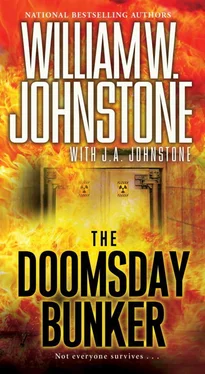Fisher said, “I don’t find anything distasteful about the idea of killing murderous bastards who want to kill us.” He turned to Larkin. “You saw that guy who came down here, Patrick. He didn’t have anything good in mind, did he?”
“No, he didn’t,” Larkin admitted. “He probably knew there was a good chance he couldn’t get in, but if he’d been able to, I think he’d have tried to hurt somebody.”
“Or get help for himself and the other survivors,” Susan said.
“They’re bound to know they’re beyond help,” Fisher said. “That’s why all they have in mind is revenge.”
Dr. Kenley said, “You can’t know what’s in their minds, Chuck. Hope is a big part of the human spirit. People don’t like to give up. They’ll cling to hope long past the point that it’s reasonable.”
“Doesn’t change the fact that they’re a danger to us.”
Moultrie said, “No, it doesn’t.” He looked at the engineers and technicians. “Start setting up an apparatus to pump the gas into the antechamber and stairwell. Stan, you’ll be in charge of actually producing the gas.”
Davis nodded. “I can do that.”
“We’re going to be doubling the guard on the entrances as well,” Moultrie continued. “I want to be sure that each man is issued plenty of ammunition. The odds of it ever coming to a fight are pretty slim, but I’d just as soon not take chances.”
Moultrie was giving orders now, Larkin thought. The “discussion” was over, and it had been mostly for show, anyway. Before Moultrie ever came in here, his mind had been made up about what he was going to do. Although if anyone had come up with a good argument against it, he might have changed his mind.
Or would he? Larkin had to ask himself that question. As he cast his mind back over the preceding months, he couldn’t recall a single occasion when anybody had talked Graham Moultrie out of anything. Moultrie would listen, then do what he wanted to do all along. Maybe the Hercules Project was a dictatorship. A benevolent one, at least so far, but still a dictatorship.
Good Lord, Larkin thought. Was he actually agreeing with Charlotte Ruskin? He didn’t trust her, that was for sure. He didn’t trust anybody who ranted about oppression and dictators. As far as he could tell, any time somebody wanted to overthrow a so-called dictator, it was so they could become one themselves.
Before Moultrie could say anything else, the speaker of the old-fashioned wired intercom on the table at his elbow crackled, and an urgent voice said, “Graham, we need you to come to the Situation Room, please, if you can find the time.”
Larkin drew in a sharp breath. He recognized that voice. It belonged to his daughter.
Moultrie pushed the button to talk and said, “On my way, Jill.” As he came to his feet, he looked at Larkin and Fisher. “You fellows come with me.”
Dr. Kenley asked worriedly, “What’s going on now?”
“I don’t know, Jessica, but I’m going to find out.”
Moultrie stalked toward the door with Fisher right behind him. Larkin hesitated just long enough to put a hand on Susan’s shoulder and squeeze, then followed them. As they walked along the hallway, Larkin saw the expressions on the faces of the other two men and said, “This isn’t good, is it?”
“‘Find the time’ is today’s Code Red phrase,” Fisher said. “It means somebody is coming down the stairs from the surface.”
The Situation Room had access to all the same feeds and data from the cameras and monitors that the regular security room did, plus the setup Moultrie used for addressing everyone in the project and override controls for all the equipment. One member of the security force was on duty there around the clock, tasked with alerting Moultrie immediately, at any hour of the night or day, if anything unusual happened. Larkin had done plenty of those shifts himself but had never had to summon Moultrie.
Jill was sitting in front of a bank of monitors. She turned her chair slightly and looked back over her shoulder. She pointed at one of the screens and said, “There he is.”
Larkin, Moultrie, and Fisher crowded in around her and leaned forward to peer at the screen. A different man than before stood on one of the steps near the bottom of the staircase. He wore a khaki shirt and jeans, and although the clothes were stained and ragged, they were in better shape than the tatters the first man had worn.
The same was true of the man himself. His long, bony face had an unhealthy pallor to it, and several sore places were visible, but his skin hadn’t begun to slough off yet. He still had brown hair on his head, although it was thinning, whether naturally or from radiation sickness, there was no way to tell. He was thin, but not to the point of starvation.
He was looking directly into the camera. His slash of a mouth opened and his lips moved. No sound came from the speakers in the Situation Room.
“No audio feed?” Larkin asked.
“It went down a while back,” Fisher said. “And we haven’t gone out to fix it.”
Larkin could understand that. “Anybody read lips?”
Jill said, “I think he’s asking if we can hear him.”
“Damn, I wish we could talk to him,” Moultrie said. “Maybe he’d let something slip about how many of them there are and what they want.”
Fisher said, “I’ll tell you what they want. They want in here.”
“You’re probably right,” Moultrie said with a nod. “Wait, what’s he doing?”
The man had taken a notebook from a hip pocket of his jeans. He slid a marker out of his shirt pocket, opened the notebook, and began writing something on one of the pages. After a moment, he turned the notebook around and held it up toward the camera so they could read the large, printed letters.
IS MY WIFE IN THERE? IS SHE SAFE? HER NAME IS CHARLOTTE RUSKIN.
“Ohhhh, hell,” Fisher said. “He’s alive.”
“That’s Nelson Ruskin?” Larkin said.
Moultrie sighed and said, “It is. I recognize him now. He’s changed a lot in the past eight months, of course.” He reached over and flipped some switches on the console in front of Jill.
“That woman can’t find out about this,” Fisher declared. “She’s raised enough hell already, and it’ll just get worse if she knows her husband is out there.”
Jill looked around and said, “You don’t think she has a right to know he’s still alive?”
“No, I don’t, and you’re not going to tell her. That’s an order.”
Larkin didn’t care for Fisher’s tone of voice as the man spoke to Jill, but he reminded himself not to think of her as his daughter right now. They were all members of the security force, and Fisher had a point. Charlotte Ruskin was already a troublemaker, and she would go batshit crazy if she found out her supposedly dead husband was right on the other side of the blast doors, alive but clearly not well.
“Anyway,” Fisher went on, “he’s got the radiation sickness, too. Look at those sores on his face.”
Larkin couldn’t stop himself from playing devil’s advocate. “It’s not as advanced a case as that other guy we saw. Maybe we could do something to help him.”
“What? Prolong his misery by a few more weeks or months?” Fisher shook his head. “Not worth the chance.”
Jill asked, “Isn’t there any way we can at least let him know his wife’s alive?”
“Not really,” Moultrie said. “I suppose we could open the inner door and try to tap out a message on the outer one in Morse code, but there’s no way of knowing if Ruskin understands it.”
“You wanted to establish communication,” Larkin pointed out. “That might be one way of doing it.”
Читать дальше









